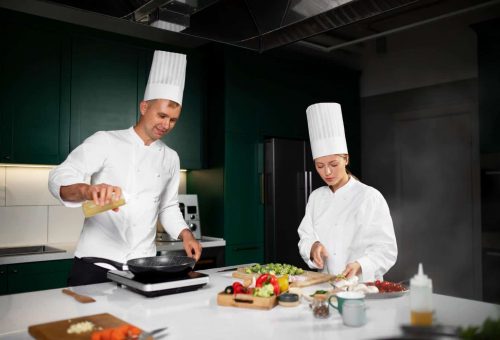Top Skills for Hospitality Professionals Employers Look For (With Real Examples)

If you’re aiming to break into the hospitality industry or climb the career ladder, it’s essential to know what employers are looking for. In a sector defined by guest experience, fast-paced environments, and diverse interactions, mastering the top skills for hospitality professionals can give you a serious edge.
Whether you work in hotels, restaurants, events, or tourism, the right skill set helps you stand out in a competitive job market. In this article, we’ll explore the top skills for hospitality professionals, offer real-world examples, and show you how to develop and present these skills to land your next role.
Why Skills Matter in Hospitality
The hospitality industry is about more than just service—it’s about creating exceptional, memorable experiences. Every interaction, from the front desk to the kitchen, contributes to customer satisfaction. That’s why employers prioritise professionals who combine technical knowledge with interpersonal intelligence and adaptability.
Mastering the top skills for hospitality professionals means you’re not only employable—you’re indispensable.
1. Customer Service: The Heart of Hospitality
At the core of every hospitality role is customer service. Whether you’re greeting guests, taking orders, or handling complaints, employers look for individuals who can deliver with empathy, efficiency, and professionalism.
Examples of Excellent Customer Service:
Personalised Service: Remembering guest preferences (e.g., room type, dietary restrictions) to make them feel special.
Effective Problem-Solving: Resolving issues like overbookings calmly and efficiently.
Going the Extra Mile: Offering upgrades, personalised notes, or complimentary touches that create lasting memories.
The ability to manage customer relationships is one of the top skills for hospitality professionals—and one that should always be highlighted on your CV.
2. Adaptability and Flexibility: Thriving in a Dynamic Industry
Hospitality is unpredictable. A sudden group booking, a last-minute menu change, or a team shortage can all throw off the day. That’s why employers seek professionals who remain calm under pressure and adjust quickly to change.
Examples of Adaptability in Action:
Shift Changes: Embracing irregular hours, weekends, and late nights with a positive attitude.
Multitasking: Managing multiple tables or front-desk requests without dropping standards.
Crisis Handling: Stepping up during staff absences, power outages, or guest complaints.
If you’re targeting seasonal roles or looking to progress into management, adaptability is among the most valuable top skills for hospitality professionals.
3. Communication Skills: Connecting with Guests and Teams
Clear, professional communication is essential in every hospitality role. Whether you’re interacting with international guests or coordinating with kitchen staff, your ability to communicate effectively can directly impact operations and guest satisfaction.
How to Sharpen Your Communication Skills:
Active Listening: Understand guest needs without assumptions or interruptions.
Clear & Polite Language: Avoid jargon, stay courteous, and confirm details.
Non-Verbal Cues: Eye contact, body language, and tone matter as much as words.
Great communication is one of the top skills for hospitality professionals that influences everything from team morale to online reviews.
4. Attention to Detail: Delivering Flawless Experiences
In hospitality, the little things are often the big things. Employers need staff who are attentive, consistent, and quality-driven in their work.
Attention to Detail in Practice:
Guest Rooms: Spotless linen, correct amenities, and a welcoming setup.
Food Service: Accurate orders, timely service, and dietary considerations met.
Events: Ensuring decor, layout, and logistics meet expectations down to the last flower or lightbulb.
Attention to detail ensures guests feel valued—and it remains one of the most frequently cited top skills for hospitality professionals by hiring managers.
5. Technical Skills: Mastering Tools of the Trade
As tech becomes more integrated into hospitality, employers want staff who can comfortably use relevant systems and software.
Key Technical Competencies:
PMS (Property Management Systems): Used in hotels for bookings, billing, and check-ins.
POS (Point of Sale) Systems: Standard in restaurants, bars, and cafes for order management.
CRM Platforms: Track guest preferences and loyalty programme data.
Gaining proficiency in these systems not only boosts your efficiency but also shows you’re ready to contribute from day one—making it one of the top skills for hospitality professionals in modern settings.
6. Cultural Awareness and Diversity Sensitivity
In a global industry like hospitality, your ability to work with people from different backgrounds—guests and colleagues alike—is invaluable. Employers increasingly prioritise professionals who demonstrate cultural awareness and inclusion.
Why It Matters:
Creates a welcoming environment for diverse guests
Prevents miscommunication or unintentional offence
Reflects well on your employer’s brand and values
Cultural sensitivity is an emerging addition to the list of top skills for hospitality professionals, especially in international or luxury settings.
How to Develop and Showcase These Skills
To land your dream hospitality job, it’s not enough to have these skills—you must show them.
Ways to Develop the Top Skills for Hospitality Professionals:
Attend workshops or short courses (customer service, conflict resolution, hospitality systems).
Gain diverse experience through part-time roles, internships, or volunteering.
Ask for feedback from managers to continuously improve.
How to Showcase Them on Your CV or in Interviews:
Use real examples: “Handled a last-minute booking for 30 guests with 3 hours’ notice”
Tailor skills to job descriptions: If the ad mentions “guest experience,” lead with your customer service wins.
Prepare STAR answers (Situation, Task, Action, Result) for each of the top skills for hospitality professionals.
📣 Final Thought: Be the Candidate Employers Are Searching For
Hospitality employers aren’t just filling roles—they’re building guest experiences. That’s why they hire people who bring service, adaptability, attention to detail, and communication to the table—every shift.
By developing and demonstrating the top skills for hospitality professionals, you put yourself in the best possible position to land rewarding, high-impact roles in this vibrant industry. It is important to keep on top of your skills through continuous professional development (CPD).
🚀 Ready to Put Your Hospitality Skills to Work?
At Goldstar Recruitment, we connect talented hospitality professionals with top employers across the UK—including London, Oxford, and The Cotswolds.
Whether you’re starting out or seeking your next career move, we’ll help you find a role where your skills shine.
📥 Send us your CV today or call 01865 249 389 to speak with our specialist hospitality recruiters.
Let’s turn your skill set into career success.


OUR SERVICES
Free Advice Appointments
If you need help with figuring out your next career step in the hospitality industry, our dedicated and experienced team are here to answer any questions you might have.
Get in touch with us and we can offer you bespoke advice and discuss the various options available to you.
Contact Info
Unit 15, Glenmore Business Park, Langford Locks, Kidlington, Oxon, OX5 1GL
Make an event staffing solutions enquiry
Latest News
Everything you need to know about the Hospitality, Commercial and Industrial markets in the Oxford area and how to become more employable.




